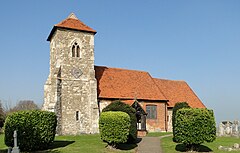Ashingdon
| Ashingdon | |
|---|---|
 St Andrew's Church, Ashingdon |
|
| Ashingdon shown within Essex | |
| Population | 3,634 (2011) |
| OS grid reference | TQ867927 |
| Civil parish |
|
| District | |
| Shire county | |
| Region | |
| Country | England |
| Sovereign state | United Kingdom |
| Post town | ROCHFORD |
| Postcode district | SS4 |
| Dialling code | 01702 |
| Police | Essex |
| Fire | Essex |
| Ambulance | East of England |
| EU Parliament | East of England |
| UK Parliament | |
Ashingdon is a village and civil parish in Essex, England. It is located about 2.5 miles (4 km) north of Rochford and is 13 miles (21 km) southeast from the county town of Chelmsford. The village lies within Rochford District and the parliamentary constituency of Rayleigh.
Ashingdon has a Parish Council. It is a rural parish, one of 14 parishes in Rochford District. The Parish is approximately 2 miles (3.2 km) north of Rochford and continues to the bank of the tidal River Crouch and the Parish includes the villages of Ashingdon and South Fambridge. Parts of Ashingdon Parish are within the village community of Hockley and the northeast part of Hawkwell Parish is within the Ashingdon village community, they face each other along the length of Ashingdon Road, a Roman Road that is still used to this day.
Ashingdon and South Fambridge have been in existence for more than one thousand years and both appear in The Domesday Book along with the Manor of Beckney within Ashingdon Parish.
According to the 2001 census, updated in 2004, the parish had 1222 dwellings and a population of 3165, increasing to 3,634 at the 2011 Census.
Ashingdon, or, more correctly, the land to the east of the village, is the presumed site of the Battle of Ashingdon on 18 October 1016. Ashingdon Hill is the likely location of King Edmund's camp, and it faces the field of battle between Ashingdon and Canewdon. Canewdon Church sits atop another hill, and beside Canewdon village was probably the site of King Canute's camp. Early chronicles report of fierce fighting at "Hyde Wood", nearly halfway between the two villages. The parish church which lies on Ashingdon Hill, one of the parish's three hills, was built in 1020, 4 years after the battle, by the order of the king, 'Canute the Great' of Denmark. The grade II listed parish church of Saint Andrew's is also called "Ashingdon Minster". The first priest at Ashingdon was one of King Canute's personal priests, a young man named Stigand, who 46 years later was the Archbishop of Canterbury who crowned King Harold and officiated at the coronation of William The Conqueror (William I). Our priest appears on the Bayeux Tapestry with the caption "STIGANT ARChIEPS." The church is now dedicated to Saint Andrew, but it is believed that it was dedicated earlier to Saint Michael, who was considered to be a military saint, and churches dedicated to him are frequently located on a hill. In 2006 Southend author, poet and historian, Ian Yearsley, wrote and published a commemorative epic poem about the battle, called 'The Battle of Ashingdon (1016)'. Subsequent editions of the poem have also been published.
...
Wikipedia

